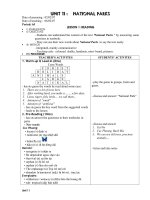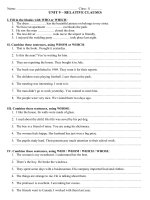tieng anh 11
Bạn đang xem bản rút gọn của tài liệu. Xem và tải ngay bản đầy đủ của tài liệu tại đây (133.6 KB, 7 trang )
SỞ GD&ĐT THANH HOÁ
KỲ THI OLIMPIC THPT
LẦN THỨ VI- NĂM 2015
ĐỀ THI MÔN: TIẾNG ANH – LỚP 11
NĂM HỌC: 2014– 2015
Đề chính thức
Thời gian:180 phút (khơng kể thời gian giao đề)
Ngày thi: /04/2015
Đề thi gồm 07 trang
Số báo danh:……………………………………………
SECTION ONE: LISTENING (15 pts)
Listen to the conversation 3 times then do the task that follow:
Section 1: Listen and fill in each of the blanks with one word
(Interviewer - I; Doctor Cohen - Dr.)
I.
And today our guest is Dr Andrea Cohen, a........... (1)..., who is researching on gossip. She
knows all about how, why and ... (2)......... we gossip. Gossip has a bit of bad.... (3)........., isn’t
it?
Dr. Yes, indeed it does. We have an idea that gossip is - you know - people..... (4)...... about other
people, saying bad things about others. That is a part of gossip, yes, but it is a very small part.
Most gossip is.... (5)...... harmless - and very natural.
Section 2: Decide whether the statement is true or false write T or F
1. Most gossip is negative.
2. Gossip is about ourselves as well as about others.
3. A lot of informal conversation is gossip.
4. Gossip gives us the feeling of leadership.
5. Thanks to modern communications, we can gossip more than ever.
Section 3: Listen to the conversation then answer the questions.
1. What is gossip?
2. Who gossip more, men or women?
3. Why do people like to gossip?
4. How people gossip more and more nowadays?
5. What do men often gossip about?
SECTION TWO: PHONETICS (5 pts)
Part A. Choose the word whose underlined part is pronouced differently from the others.
1. a. apply
b. university
c. identity
d. early
2. a. choice
b. achieve
c. each
d. chemistry
3. a. final
b. applicant
c. high
d. decide
4. a. average
b. indicate
c. application
d. grade
5. a. course
b. four
c. our
d. yours
Part B. Choose the word whose main streess syllable is different from the other word in each
group.
1. a. expression
b. easily
c. depression
d. disruptive
2. a. algebra
b. musical
c. politics
d. apartment
3. a. mechanic
b. chemistry
c. cinema
d. finally
4. a. typical
b. favorite
c. division
d. organize
5. a. computer
b. establish
c. business
d. remember
SECTION THREE: LEXICAL AND GRAMMAR (15pts)
Part A. Choose the most suitable word or phrases to complete each sentence.
1. Not until .................. home .................. that he had taken someone else's bike.
A. did he get/ he realised
B. he got/ did he realise
C. he got/ he realised
D. he got/ he did realised
2. A: “…………………………..”
B: “ I have a terrible headache.”
A. What’s the matter with you?
B. What’s the problem to you?
C. What happens with you?
D. What causes you?
3. By next June, I ……………in this school for 15 years.
A. will be working B. will have been working
C. will work D. has worked
4. The world's population is __……………………to be over 7 billion by 2015.
A. claimed
B. blamed
C. expected
D. reached
5. It's time you……………………something to save the wildlife.
A. do
B. did
C. have done
D. will do
6. The princess was …………… by four girls.
A. preceding
B. precede
C. precedes
D. preceded
7. I'd really like to do accounting. If only I ……………………_ so bad at the subjects.
A. am not
B. weren't C. hadn't been
D. wouldn't be
8. Polar bears are ……………for their fur and other valuable parts of their bodies.
A. hunted
B. chased
C. run after
D. followed
9. He …………………… the thick coat and make New Year's wishes to his parents.
A. take on
B. pick on
C. put on
D. try on
10. The prime minister had a talk to the national press.
(Find the word with the same meaning)
A. television
B. newspapers
C. Internet D. radio
11. We need to _……………………one million dollars to America.
A. transfer
B. transform C. transmit D. transact
12. –A: “ What a nice hat you have!.”
-B: “…………………”
A. It’s nice of you to say so.
B. Am I? Thanks.
C. Oh, poor me.
D. I am interesting to hear that.
13. We should….………steps against the pollution.
A. use
B. make
C. take
D. apply
14. You should ……………………an eye on the babies.
A. take
B. keep
C. have
D. make
15. I will…………………………to see my friends.
A. drop in on
B. come up with
C. get on with
D. run into
16. _............... of all the students, I would like to wish you happiness.
A. On behalf
B. In place
C. Instead
D. On account
17. Are you looking for anything in ___________?
A. special
B. detail
C. peculiar
D. particular
18. It is imperative that the boy…………….immediately.
A to come
B. came
C. comes
D. come
19. Do you mind if I open the window?
A. Yes, it is, isn’t it?
B. Yea, of course.
C. Please, don’t worry!
D. I’d rather you didn’t.
20. The accumulation of book…………. is one part of school education.
A. know
B. knowledge
C. knoledgeable
D. knowing
Part B. Choose the letter of the underlined word or group of words that is not correct.
1 It is believed(A) that in the near future (B) robots will be used to doing (C) things such as
(D)cooking.
2: John announced that(A) he could not longer tolerate (B) the conditions of (C) the contract under
which (D) he was working
3: After driving(A) for twenty miles, he suddenly realised (B)that he has been driving(C) in the
wrong direction(D).
4: I think she will be(A) suitable for(B) the work because she has been working (C) like (D) a
teacher for a long time
5: Passengers are required (A) to arrive to(B) the gate fifteen minutes before (C) departure time(D).
6: A paragraph(A) is a portion of a text consists of (B) one or more sentences(C) related to(D) the
same idea.
7. Chemical engineering is based on(A) the principles(B) of physics, chemists(C), and
mathematics(D).
8. I hadn’t understood(A) his directions. However(B), I asked him(C) to repeat what he’d said(D).
9: Although there were(A) a lot of opposition(B) initially, many people now(C) accept that infertile
couples have the right to medical help(D).
10: With the development of (A) the Internet and the World Wide Web, businessmen(B) do not
hardly have(C) as much traveling as they used to(D).
SECTION FOUR: READING COMPREHENSION. (15 pts)
Part A. Read the following passage and then choose the most suitable word or phrase for each
space.
The (1) …………….. of book knowledge is one part of school education but this kind of
learning can be and often is carried to (2)…………….. in many countries so that no time for other
interests IS (3) …………….. to young people. Not only must they attend school (4) ……………..
five-hour periods on six days of the week, studying possibly as many as thirteen different subjects,
but in addition they may even go to afternoon institutes for (5) …………….. _ instruction. They
have almost no chance of taking (6) …………….. any of their own hobbies or becoming familiar
with the plants and (7) …………….. life of the countryside except during their summer holidays.
Early youth should be a time of exploration and adventure, of reading books for (8) ……………..
as well as study, of freedom to enjoy life before the responsibilities of working for a living and (9)
…………….. a family (10) …………….. an end to study, to freedom and only too often to
carefree enjoyment.
1. a. gathering
2. a. extremity
3. a. available
4. a. during
5. a. farther
6. a. on
7. a. untamed
8. a. pleasure
9. a. creating
10. a. hold
b. collection
b. excess
b. provided
b. for
b. additional
b. up
b. original
b. amusement
b. bringing
b. put
c. obtaining
c. limits
c. devoted
c. throughout
c. extra
c. back
c. wild
c. joy
c. building
c. indicate
d. accumulation
d. boundary
d. reserved
d. in
d. further
d. over
d. natural
d. entertainment
d. raising
d. mark
Part B. Read the following passage, and then choose the best answer to questions below.
Millions of people are using cellphones today. In many places, it is actually considered unusual
not to use one. In many countries, cellphones are very popular with young people. They find that the
phones are more than a means of communication - having a mobile phone shows that they are cool
and connected.
The explosion in mobile phone use around the world has made some health professionals
worried. Some doctors are concerned that in the future many people may suffer health problems
from the use of mobile phones. In England, there has been a serious debate about this issue. Mobile
phone companies are worried about the negative publicity of such ideas. They say that there is no
proof that mobile phones are bad for your health.
On the other hand, medical studies have shown changes in the brain cells of some people who
use mobile phones. Signs of change in the tissues of the brain and head can be detected with modern
scanning equipment. In one case, a traveling salesman had to retire at young age because of serious
memory loss. He couldn't remember even simple tasks. He would often forget the name of his own
son. This man used to talk on his mobile phone for about six hours a day, every day of his working
week, for a couple of years. His family doctor blamed his mobile phone use, but his employer's
doctor didn't agree.
What is it that makes mobile phones potentially harmful? The answer is radiation. High-tech
machines can detect very small amounts of radiation from mobile phones. Mobile phone companies
agree that there is some radiation, but they say the amount is too small to worry about.
As the discussion about their safety continues, it appears that it's best to use mobile phones less
often. Use your regular phone if you want to talk for a long time. Use your mobile phone only when
you really need it. Mobile phones can be very useful and convenient, especially in emergencies. In
the future, mobile phones may have a warning label that says they are bad for your health. So for
now, it's wise not to use your mobile phone too often.
1. According to the passage, what makes mobile phones potentially harmful is …______.
A. their radiant light
B. their power of attraction
C. their raiding power
D. their invisible rays
2. According to the writer, people should …….______.
A. only use mobile phones in urgent cases
B. only use mobile phones in medical emergencies
C. keep off mobile phones regularly
D. never use mobile phones in all cases
3. The most suitable title for the passage could be …………______.
A. “The Reasons Why Mobile Phones Are Popular”
B. “The Way Mobile Phones Work”
C. “Technological Innovations and Their Price”
D. “Mobile Phones: A Must of Our Time”
4. According to the passage, cellphones are especially popular with young people because
__...............
A. they are indispensable in everyday communications
B. they make them look more stylish
C. they keep the users alert all the time
D. they cannot be replaced by regular phones
5. Doctors have tentatively concluded that cellphones may ________.
A. damage their users’ emotions
B. change their users’ temperament
C. cause some mental malfunction
D. change their users’ social behaviours
6. The man mentioned in the passage, who used his cellphone too often, ______.
A. suffered serious loss of mental ability
B. could no longer think lucidly
C. abandoned his family D. had a problem with memory
7. The changes possibly caused by the cellphones are mainly concerned with ______.
A. the mobility of the mind and the body
B. the arteries of the brain
C. the smallest units of the brain
D. the resident memory
8. The word "means" in the passage most closely means ______.
A. meanings
B. expression
C. method
D. transmission
9. The word "potentially" in the passage most closely means ______.
A. possibly
B. obviously
C. certainly
D. privately
10. "Negative publicity" in the passage most likely means ______.
A. information on the lethal effects of cellphones
B. poor ideas about the effects of cellphones
C. the negative public use of cellphones
D. widespread opinion about bad effects of cellphones
Part C. Read the following passage, and then choose the best answer to questions below.
Western people rely on technical and mechanical solutions in everything they do. Refrigerators
preserve their food, washing machines clean their underwear and computers are supposed to solve
all their problems. When they are ill, they rely on surgeon’s knife. If their hearts are running down,
then they must be repaired; if they cannot be repaired, they should be replaced, just as an old car
sometimes gets a new engine. But up to now, we have had a shortage of donors to give their hearts:
to keep one person alive, another donor had to die.
Nowadays there are more and more talks about using monkeys. Every monkey has a near-human
heart, and human have always been over careful in respecting the life and well-being as other
animals.
This includes the life and well-being of other humans. Therefore in the early years of the
21st century - I was told - the mass killing of monkeys may occur. We will need to use their heart for
human consumption.
Monkeys, on the whole, are happier creatures than their near relatives, Homo Sapiens, or man.
They know fear, of course, and they face real danger, but they are more intelligent than us. They create
no unnecessary dangers for themselves, they run no business, chase no money, and unimpressed by
gold - that utterly useless metal, they do not care at all about hell or evil spirits. I have a vague feeling
that it is not monkey’s heart that we ought to implant in ourselves but monkey’s brains.
1. The main point the author is making is that humans ……
A. make life more complex than it needs to be. B. are similar in many ways to monkeys.
C. have no right to make use of other animals. D. should worry less about growing
old.
2. The author was told that the mass killing of monkeys may occur in the 21st century because …
A. the lack of animal’s meat for human consumption.
B. science may transform monkey’s heart into human heart.
C. monkeys are no longer necessary in forests.
D. the lack of donors and monkey’s heart may be the alternative.
3. The author suggests we should implant monkey’s brain in ourselves instead of its heart
because…….
A. he thinks it is the cheapest way to implant.
B. they are unconcerned about material gains as humans do.
C. monkeys do not know at all about hell or evil spirits.
D. they can learn everything more quickly than humans.
4. The author says that monkeys _.......______.
A. live in a relatively safe world in the jungle. B. are not capable of logic thinking.
C. are usually more content than humans.
D. are not able to feel emotions like fear.
5. According to the author, Westerners believe health problems can be solved by _______.
A. spending more money on scientific research. B. using technical or mechanical methods.
C. taking more precautions.
D. increasing the number of doctors.
6. Monkeys’ hearts are supposed to be used in transplanting in human body because…
A. monkeys and humans are alike.
B. man doesn’t consider animal life is as important as that of man.
C. their heats are nearly similar to those of human.
D. humans have the same hearts as monkey.
7. The word “they" in the 1st paragraph refers to……… _______.
A. westerners
B. hearts
C. doctors
D. repairers
8. The author consider that __............_____.
A. human being will return to more nature lifestyles.
B. monkeys would be better at running the world than humans.
C. scientists should work out how to do brain transplants.
D. we are wrong to think of ourselves as cleverer than monkeys.
9. The phrase “running down” is similar in meaning to……. _______.
A. going away
B. decaying
C. deteriorating
D. letting down
10. The problem with heart transplants has been that _.........______.
A. artificial hearts do not work very well.
B. some of the heart donors are too old.
C. there are not usually enough donors.
D. many people die after the operations.
SECTION FIVE: WRITTEN TEST(50pts)
Part A. Open Close Test- Fill in each blank with one suitable word.
Many people now think that teachers give students too much homework, They say that it is
unnecessary for children to work at home in their free time. Moreover, they argue that (1)……..
teachers do not properly plan the homework tasks they give to students. The result is (2)……….
students have to repeat tasks which they have already done at school.
Recently in Greece many parents (3)………… about the difficult homework which teachers
gave to their children. The parents said that most of the homework was a waste of time, and they
wanted to stop it. Spain and Turkey are two countries which stopped homework recently. In
Denmark, Germany and several (4)……..countries in Europe, teachers cannot set homework at
weekends. In Holland, teachers allow students to stay at school to do their homework. The children
are free to help (5)….. another. Similar arrangements also exist in some British schools.
Most people agree that homework is unfair. A student who can do his homework in a quiet and
comfortable room is in a (6)……..better portion than a student who does his homework in a small,
(7)……..room with the television on. Some parents help their children with their homework. Other
parents take no interest (8)……..all in their children's homework.
It is important, (9)……….., that teachers talk to parents it homework. A teacher should suggest
suitable tasks for parents to do with their children. Parents are often better at teaching their (10)……
children!
Part B. Put each verb in brackets into an appropriate form.
The launch of the James Webb will require __________-1-(TECHNOLOGY) cunning
unequaled in the post-Apollo era. The base of the telescope, a six-layer sunshade, is __________-2(ROUGH) as long and wide as a tennis court. It will sit well beyond the moon, in a special pocket of
gravity one million miles from Earth. Rather than orbit the Earth and whirl daily into the hot face of
the sun, the Webb will use the combined gravity of the two to hide in a fixed position within the
Earth’s shadow. Its 18 hexagonal mirrors, made of beryllium and coated in 24-carat gold, will
operate at temperatures near ________-3- (ABSOLUTELY) zero — the point at which all motion
ceases — in order to remain ________-4- ( SENSE) to the faint infrared emanations of deep space.
In this way ____________-5- ( MOVE) in the heavens may be likened to sound, of which Emerson
wrote, “Let us be ____________6- (SILENCE), that we may hear the whispers of the gods.” Upon
arriving in space, the Webb will attempt an ______________-7- ( PRECEDENT) feat of reverse
origami: It will emerge bundled from the tip of an Ariane rocket and slowly unfurl its shade, mirrors,
and instruments, becoming in the process the world’s largest space____________-8- (OBSERVE) ,
its seeing power 100 times that of the Hubble. The stakes for this ____________-9- (METAPHOR)
are high, for even with tomorrow’s technology, repair at such a remove from Earth will
be____________--10- (POSSIBLE) . If for any reason the Webb should fail after launch, it will be
left to idle in space, out of reach, a stillborn in the void.
Part C. Use the correct form of the given words to complete the sentences.
The secretary was very busy all day dealing with …………
(ENQUIRE)
The teacher stressed the need for regular……….
(ATTEND)
Sarah …… opened the door of the cellar, wondering what she might find. (CAUTION)
The…………. of the fire was very welcome after our long journey.
(WARM)
This jewel isn’t simply valuable, it is ………………
(VALUE)
The………………. of those who have nowhere to live is ignored.
(MISERABLE)
Unfortunately, the natural resources are becoming ………… for the support of the increasing
population.
(ADEQUATE)
8. The thief replaced the diamond with a ………… stone.
(WORTH)
9. He may not be a handsome man, but he’s a………………. husband. (RELY)
10. You’d better drive. I’m too ………………… for such traffic.
(EXPERIENCE)
1.
2.
3.
4.
5.
6.
7.
Part D. Sentence Transformation
I. Finish each of the following sentences in such a way that it is as similar as possible in meaning
to the sentence printed before it.
1.
She’d just put up her umbrella when the rain came down in torrents.
- No sooner …………………………………………………………………
2.
The manager threatened not to select him for the team unless he trained harder.
- “If he doesn’t train …………………………………………………
3.
It is the banker, not his assistant that I want to see.
- I want to see ………………………………………………………
4.
Never have there been more people out of work in this city.
- There are more people ……………………………………………
5.
Parents and pupils are protesting against the head teacher’s decision to send pupils with
long hair home.
- The head teacher’s ………………………………………………………
6.
It came as no surprise to me that Harry had failed his driving test.
- I was not surprised …………………………………………………
7.
Some amazing experiments have been carried out by biologists recently, haven’t they?
- Don’t you believe that…………………………………………….
8.
I’m so annoyed by my little brother sometimes.
- My little brother can ………………………………………………
9.
There has been a considerable fall in the value of these goods in the past week.
- The value of ………………………………………………………
10.
I’m sure Peter didn’t mean to offend you.
- Peter can’t ……………………………………………
II. Finish each of the following sentences in such a way that it is as similar as possible in
meaning to the sentence printed before it, using the words given. You must not change the words
in any way.
1. I do not want to criticize him because he is a good friend of mine.
(reluctant)
→ ……………………………………………………………………………
2. Her job is making her miserable.
(down)
→ ……………………………………………………………………………
3. She gets bored with things quickly.
(bore)
→ ……………………………………………………………………………
4. I am not surprised that he has got financial problems
(cames)
→ ………………………………………………………………………
5. I was so surprised that I could not say anything.
( speechless)
→ …………………………………………………………………………
6. She has a high opinion of you .
(highly)
→ ……………………………………………………………………………
7. I really want to see her again
(dying)
→ ……………………………………………………………………………
8. Behave in my house as you would in yours.
(make)
→ ……………………………………………………………………………
9. Her income is vital to them
(rely)
→ ……………………………………………………………………………
10. I have a friendly relationship with everyone at work.
(terms)
→ ……………………………………………………………………………
______THE END_______









